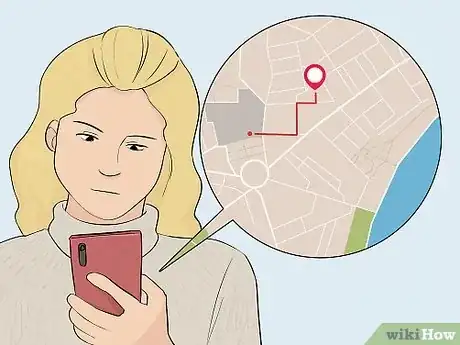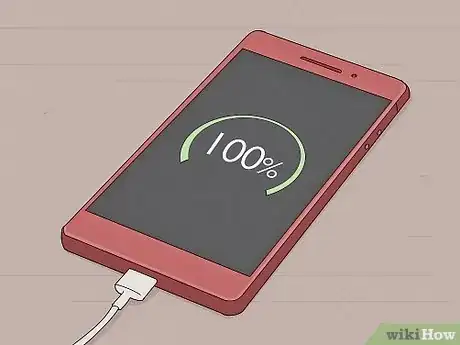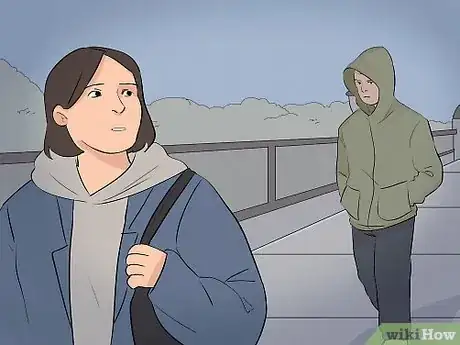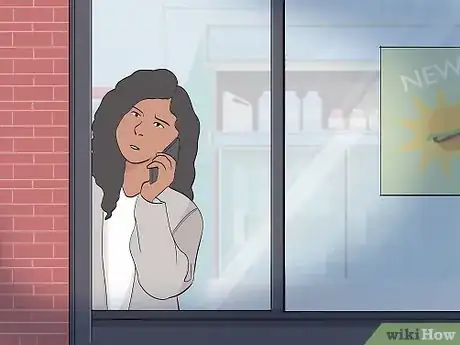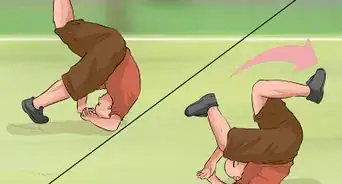This article was co-authored by Adrian Tandez. Adrian Tandez is the founder and head instructor of the Tandez Academy, a world-renowned self-defense training center in Mountain View, California. Trained under the renowned martial artist Dan Inosanto, Adrian is a certified instructor in Bruce Lee's Jeet Kune Do, Filipino Martial Arts, and Silat, among other things. Adrian has over 27 years of self defense training experience.
There are 8 references cited in this article, which can be found at the bottom of the page.
This article has been viewed 95,386 times.
Fear of crime can make you wary of walking or traveling at night. But being uneasy doesn’t mean you need to stay home and miss the good times with your friends. Being prepared, planning your route, and knowing what to do in an emergency will make your night out safe, as well as fun.
Steps
Being Prepared
-
1Tell someone where you are going. Before you leave home, let someone know where you are going and when you expect to be back. You might also want to send them a quick text when you arrive at your destination. If they don’t receive your text, or you don’t arrive home when expected, they can check to make sure everything is OK.[1]
- You can also download an app such as FindMyFriends that allows you to share your location with others, as well as find friends nearby. Several of these apps also contain ways to quickly broadcast your location in an emergency situation.[2]
-
2Plan your travel route. By knowing exactly how you are getting to your destination, you will reduce your travel time and reduce the chances of getting lost in an unfamiliar area. You will also feel and appear confident, which reduces your chance of being approached by troublemakers.[3]Advertisement
-
3Charge your cell phone. Always have a fully charged cell phone with you. If you are in trouble, you can quickly call for help. You might also need your phone to use mapping or other functions to get you to your destination safely.[4]
-
4Invest in a whistle. A simple whistle is often the easiest way to chase off troublemakers. Pepper spray, which will incapacitate an attacker, is also an option if it is legal in your area, but make sure you check that it definitely is legal first before you bring one with you. The last thing you want to happen when out is to be searched by a police officer then arrested for possessing an offensive weapon.[5]
- Pepper spray needs a little practice to use correctly. Get comfortable using your thumb to push the button so you can hold the canister securely in the palm of your hand with the other four fingers. Learn how to unlock the safety switch quickly. Practice a few times with your canister to learn how far away you can stand and still reach your target. Some sprays can reach up to ten feet.[6]
-
5Carry a small flashlight. Keep a mini flashlight on your keychain, where it will always be with you. It will provide light in extra dark areas and give you more confidence. Or learn to use the built-in torch on your phone. You can download a flashlight app if your phone doesn't have a built-in option.
-
6Find another means of transportation if possible. If a situation is dangerous or uncomfortable for you, find another way to get home. This includes public transportation, getting a taxi, or calling a friend to drive you home. Make sure you are waiting in a well-lit area.
Getting to Your Destination
-
1Travel with a friend or in a group. There truly is safety in numbers, as criminals are less likely to attack a group than an individual. If you are going out alone, you can use an app such as Map My Friends to find friends nearby to meet up with. Or check your university message board to find others looking to go out.[7]
- Many cities and universities provide free shuttles around town to popular restaurants and clubs. Using this option provides a safe way to get to and from your destination. Another popular option with college students is a "call a buddy" system that has volunteers on-call to walk you home.[8]
-
2Stay away from unsafe places at night. Areas like this include dark alleyways, areas bordered by thick vegetation, places with few or no people around, and areas with low levels of light. If you can, stay away from these areas whenever possible. The likelihood of you becoming a victim of crime drastically increases when you enter unsafe areas.
-
3Carry yourself with confidence. Enter a building or board public transportation with confidence. Walk with your head up. Not only will it help you see what is happening around you, but it will give you an air of confidence that will prevent assailants from approaching you as a weak and easy target.[9]
- Be confident but don’t attract the wrong kind of attention. Flashy jewelry, large purses, expensive clothing and attention-grabbing antics can make you a target.
-
4Be aware of your surroundings. Look around while you walk and pay attention to what is going on around you. It will give you an early warning if someone is looking to make trouble. You’ll want to avoid earphones and any article of clothing, such as a hoodie, that might interfere with your hearing or vision.[10]
- You don’t want to be distracted by chatting on your phone when walking, but it can sometimes make you feel safer to talk to someone when you are alone so they know where you are. Just make sure the conversation allows you to keep track of those around you.
-
5Follow a familiar route. Traveling at night, especially if you are alone, isn’t the time to try to take new routes or shortcuts through unfamiliar neighborhoods. If you must venture into unfamiliar territory, make sure you have determined a route ahead of time so you don't end up lost. [11]
-
6Stay in the well-lit areas. Walk or drive in well-lit, highly visible areas. Even if it takes you longer, stay on a well-lit route rather than taking shortcuts down dark roads or paths. Stick to streets populated with houses and shops rather than empty lots or vacant stores.
- Park in well-lit areas, as well. If it is still light when you park, visualize what the area will look like in the dark when you return. Look for overhead lights and park there. Always take note of where you park so that you can easily find your car.[12]
-
7Carry keys in your hand. When walking home or going back to your car at the end of the evening, have your keys in your hand to allow quick entry into your home or car.
-
8Trust your instincts. If a situation feels sketchy, don’t be embarrassed to leave or ask for help. Your instincts are there to protect you.[13]
-
9Be aware of strangers. If you see someone who is suspicious to you, or if you get a bad feeling, escape the situation. You are not obligated to be with anyone who disturbs you. Be aware of your surroundings, and be careful of people who ask for help. Sometimes, pleas for help are an attempt to play on your sympathy.
Handling an Emergency
-
1Have a plan. Know what you plan to do and where you will go in case of trouble. This plan should include who you will call if you need someone to pick you up. You should also be familiar with safe places along your route that you can run to if needed.
-
2Stay calm. If confronted, stay calm and confident. Being calm will give you a chance to assess the situation. If your assailants simply want property, it is often safest to give it to them. If they want to cause harm, you need to get away. Run if you can. If you can’t get away, fight as hard as you can. Aim to inflict pain by lashing out at eyes, the bridge of the nose, knees and groin.[14]EXPERT TIPAdrian Tandez is the founder and head instructor of the Tandez Academy, a world-renowned self-defense training center in Mountain View, California. Trained under the renowned martial artist Dan Inosanto, Adrian is a certified instructor in Bruce Lee's Jeet Kune Do, Filipino Martial Arts, and Silat, among other things. Adrian has over 27 years of self defense training experience.Self Defense Trainer

 Adrian Tandez
Adrian Tandez
Self Defense TrainerFight instead of cooperating. Adrian Tandez, a self defense expert, says: “Never cooperate with your captors. If someone says, “Do what I tell you, and I won’t hurt you,” don’t believe them. They will get what they want from you no matter what. You need to fight as hard as you can and run away.”
-
3Make noise. Attackers don’t want to get caught. Do whatever it takes to attract attention. Yell for help. Scream. Blow the whistle you invested in before you left for the night.[15]
- Telling people what to do is more effective than yelling something like, “Fire.” Instead, yell, “I’m being attacked – call 911!” Or yell directly at the attacker: “Get your hand off me!” or even just “Stop!”[16]
-
4Get to a safe place. As soon as you can, get to a safe place, such as a shop or nearby house. Call the police and report the incident. Include details of the confrontation, as well as a description of the perpetrator.
Expert Q&A
-
QuestionHow can I stay safe at night at home?
 Adrian TandezAdrian Tandez is the founder and head instructor of the Tandez Academy, a world-renowned self-defense training center in Mountain View, California. Trained under the renowned martial artist Dan Inosanto, Adrian is a certified instructor in Bruce Lee's Jeet Kune Do, Filipino Martial Arts, and Silat, among other things. Adrian has over 27 years of self defense training experience.
Adrian TandezAdrian Tandez is the founder and head instructor of the Tandez Academy, a world-renowned self-defense training center in Mountain View, California. Trained under the renowned martial artist Dan Inosanto, Adrian is a certified instructor in Bruce Lee's Jeet Kune Do, Filipino Martial Arts, and Silat, among other things. Adrian has over 27 years of self defense training experience.
Self Defense Trainer Make sure you lock your doors before you go to sleep. If you're living in a dangerous neighborhood, get as much security as you can. If you can afford getting a security camera, that's good. If you have some sort of security system, that's even better. Have some sort of handheld weapon next to you just in case, and make sure your phone is working so you can call 911. And just be aware of your environment without getting paranoid.
Make sure you lock your doors before you go to sleep. If you're living in a dangerous neighborhood, get as much security as you can. If you can afford getting a security camera, that's good. If you have some sort of security system, that's even better. Have some sort of handheld weapon next to you just in case, and make sure your phone is working so you can call 911. And just be aware of your environment without getting paranoid.
Warnings
- Never enter unsafe neighborhoods if you can avoid it. If there is a safe route that takes longer compared to a short but dangerous route, take the safer one. Saving your life is better than saving time.⧼thumbs_response⧽
- Avoid suspicious-looking people, such as individuals covering their faces, individuals loitering, and people in dark streets and alleyways.⧼thumbs_response⧽
- Never look down at your phone when out at night. This gives the impression that you aren't paying attention to your surroundings and makes you a good target. This includes talking on the phone to a friend while you walk.⧼thumbs_response⧽
References
- ↑ http://www.protection1.com/campus-safety/night-safety-tips
- ↑ https://www.cnet.com/news/location-tracking-apps
- ↑ http://www.protection1.com/campus-safety/night-safety-tips
- ↑ http://www.protection1.com/campus-safety/night-safety-tips
- ↑ http://www.canadianliving.com/health/mind-and-spirit/article/9-ways-to-stay-safe-when-walking-alone
- ↑ https://www.family-selfdefense-academy.co.za/blog/how-to-use-pepper-spray-correctly
- ↑ http://www.protection1.com/campus-safety/night-safety-tips
- ↑ https://verifystudents.com/2014/10/03/university-of-virginia-introduces-buddies-on-call
- ↑ http://www.telegraph.co.uk/sponsored/education/the-axis/culture_club/11729789/safety-advice-for-students.html
- ↑ http://www.telegraph.co.uk/sponsored/education/the-axis/culture_club/11729789/safety-advice-for-students.html
- ↑ http://www.telegraph.co.uk/sponsored/education/the-axis/culture_club/11729789/safety-advice-for-students.html
- ↑ http://www.protection1.com/campus-safety/night-safety-tips
- ↑ http://www.canadianliving.com/health/mind-and-spirit/article/9-ways-to-stay-safe-when-walking-alone
- ↑ http://abcnews.go.com/GMA/HealthyWoman/story?id=125859&page=1
- ↑ http://defendyourself.org/2015/06/should-i-yell-fire/
- ↑ http://defendyourself.org/2015/06/should-i-yell-fire/

